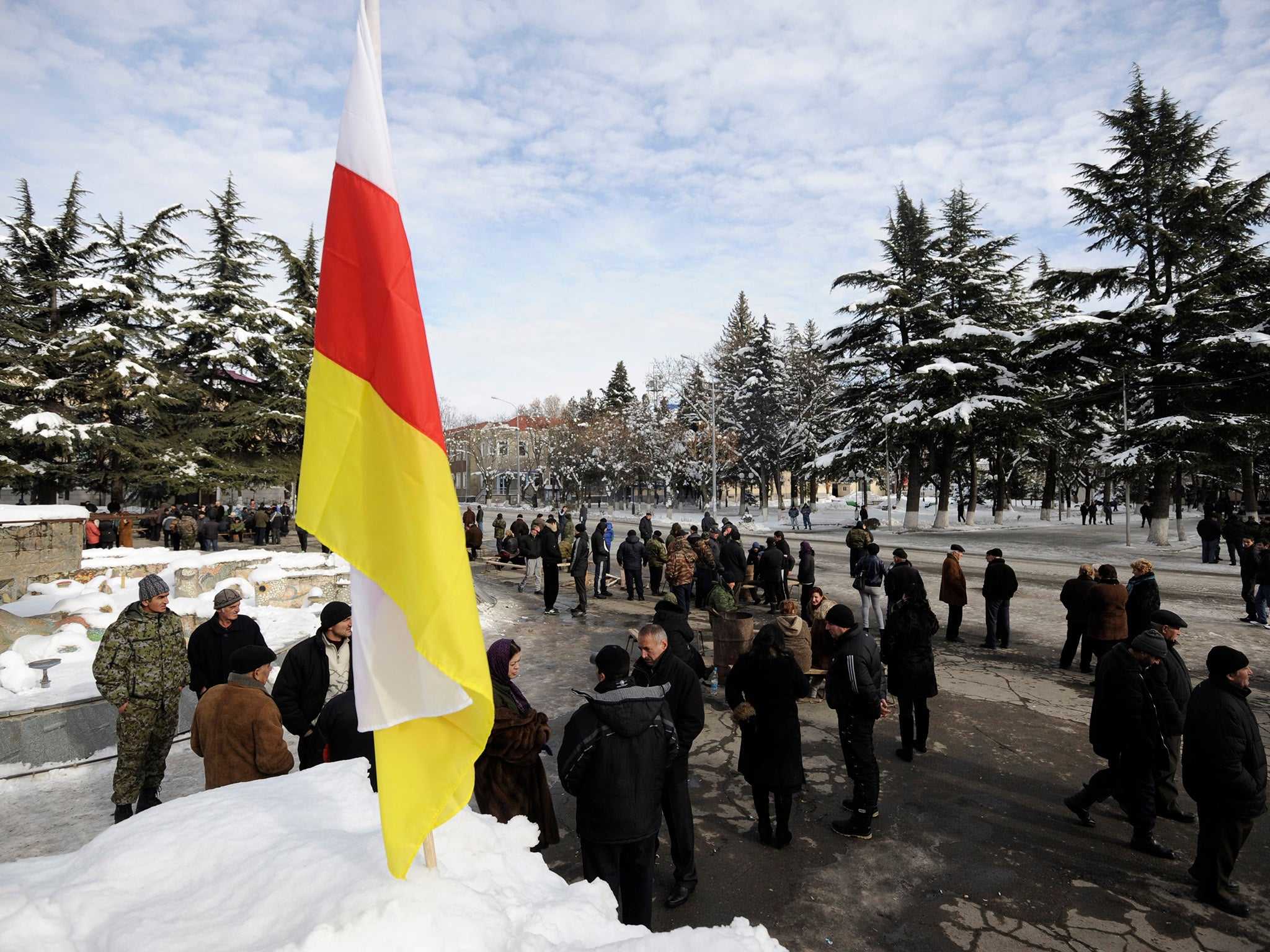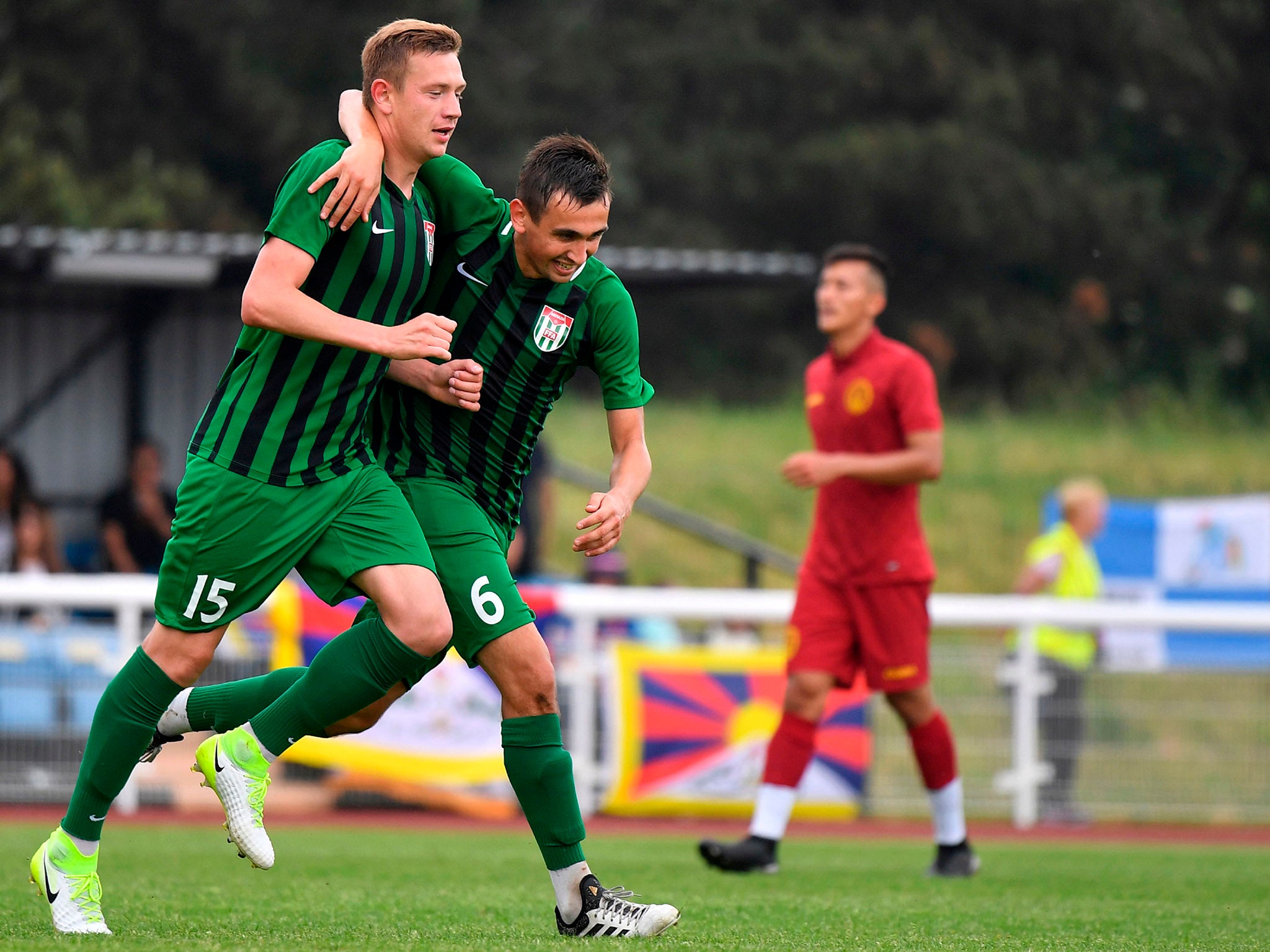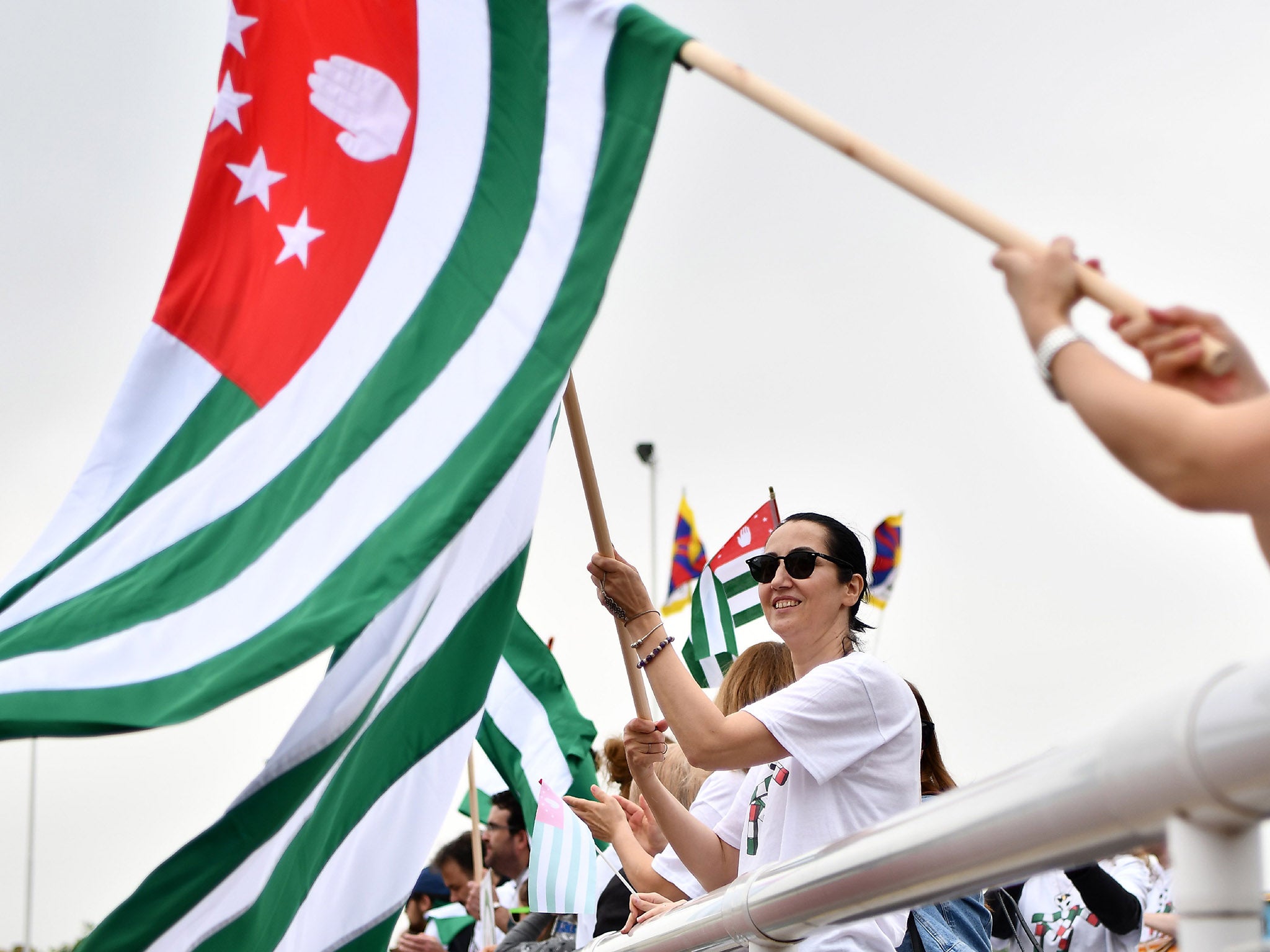World Cup 2018: Away from the party in Russia, neighbouring Abkhazia fight to be eligible for a Fifa invitation
Follow all the latest from the World Cup 2018 in Russia

Your support helps us to tell the story
From reproductive rights to climate change to Big Tech, The Independent is on the ground when the story is developing. Whether it's investigating the financials of Elon Musk's pro-Trump PAC or producing our latest documentary, 'The A Word', which shines a light on the American women fighting for reproductive rights, we know how important it is to parse out the facts from the messaging.
At such a critical moment in US history, we need reporters on the ground. Your donation allows us to keep sending journalists to speak to both sides of the story.
The Independent is trusted by Americans across the entire political spectrum. And unlike many other quality news outlets, we choose not to lock Americans out of our reporting and analysis with paywalls. We believe quality journalism should be available to everyone, paid for by those who can afford it.
Your support makes all the difference.Amongst a sparse crowd at the Davit Petriashvili Stadium, where the ugly relics of old industrial-era Soviet Tbilisi peer intrusively over the shallow main stand, Ashkar Sanakoyev looks like just another spectator. There is little sense of the role he has played in attempting to heal a fractured country.
“We wanted to show people that there is a possibility here to play football and develop in another direction,” he explains. “The club is part of a much larger picture.” That club is FC Tskhinvali, and the picture is of a united Georgia, a nation tucked away at the Eurasian crossroads, cracked by three decades of separatism and conflicts now frozen cold.
Tskhinvali were formed in 2007 in the breakaway republic of South Ossetia, a region in the north of little Georgia that, in 1991-92, fought a bloody war with Tbilisi for its independence. Today, it enjoys de facto self-governance, buoyed by financial and military support from Russia.
Funding for the club came from South Ossetia’s government in exile, an alternative administration for those Ossetians who saw their future, not in Russian-backed independence, but in alliance with Georgia. At its peak, the administration was receiving around $7m of Georgian state funding. The football club was the jewel in its crown.
Ten years have now passed since a blitzkrieg conflict with Moscow pushed FC Tskhinvali out of South Ossetia and into Tbilisi, and further undermined the cause of Georgian unity. Today, as the government announces fresh initiatives to build bridges with the country’s separatist territories, the cause has rarely felt more futile.
Baby-faced and decked out in joggers and a loose-fitting hoody, Tskhinvali’s sporting director Sanakoyev sits perched on the lip of his seat, half keeping an eye on the curtain raiser to the Georgian football season between Torpedo Kutaisi and Chikhura Sachkhere which has just kicked off for the second half. He is doleful as he sets the scene.

“FC Tskhinvali are a symbol of common purpose between Georgians and South Ossetians,” he says. But the truth is that the two peoples are firmly divided by the thick end of history. So much so, that Sanakoyev no longer feels safe returning home. A visible champion for a unified Georgia, his safety cannot be guaranteed.
“I prefer not to show up in South Ossetia these days,” he says. “I don’t think I would have problems with the law necessarily, but there will be people who would not like to see me back there. You never know what could happen, especially when people know who you are.”
The conflict has deep roots. In the last years of the Soviet Union, nationalist fervour found expression throughout Transcaucasia. As anti-Soviet resentment sprouted across Georgia, it quickly became synonymous with a rejection of the separatist movement that was developing in Abkhazia, an autonomous province on the Black Sea coast in the country’s north with its own language, customs and culture.
Georgian nationalists accused the Soviet authorities of lending support to the Abkhazians’ call for their own state, as riots erupted in the capital cities of both regions. Meanwhile in South Ossetia, local tensions escalated, culminating in a Georgian military intervention that, by 1991, had divided the region along loyalist-separatist lines.
As the USSR meekly breathed its last, the foothills of the south Caucasus mountains took up arms in anticipation of fresh conflict.
Nearly 30 years later, there is little light that penetrates the fog. Diplomatic efforts on the Georgian side of the militarised South Ossetian border to find a peaceful settlement have, after early optimism, petered out. FC Tskhinvali, though, have kept up the fight, an un-yielding symbol of unity as belligerence reigns.
“Before 2008, there was a lot of investment from the Georgian government going into the parts of Ossetia that was still under its control,” says Sanakoyev. “In Tskhinvali region, only the capital was under Ossetian rule, but the Georgian-held regions had a lot of European investment. They were building schools and sports facilities, to prove to people that life was improving here. Football was a big part of it.”
So much so that, upon the club’s founding, they were parachuted directly into the Erovnuli Liga, the country’s top flight, on the say so of the Georgian government, bypassing a potentially long and drawn-out route up through the divisions.
“That was a political decision.” says Sanakoyev. “That first season was very, very tough. We started the club in July and our season began in August.”
Tskhinvali did survive that season, just, but things have been tougher in recent years. The budget provided by the South Ossetian government in exile, headed by Sanakoyev’s father, Dmitry, has been slashed since the project was first established, a trend the sporting director attributes to a waning interest in the club’s affairs as the possibility of reconciliation has dwindled. In 2016, Tskhinvali were relegated from the Erovnuli Liga altogether.
Elsewhere in separatist Georgia, hope trumps expectation. In Tbilisi, second division outfit FC Gagra remain a lasting relic of the desire to restore the republic’s international frontiers.

The club takes its name from the city in the breakaway republic of Abkhazia where, in September 1992, separatist forces violated a Russian-brokered ceasefire, paving the way for the city’s occupation. By the following September, Georgian troops had been expelled from Abkhazia fully. The fall of Gagra is a sacred moment in Abkhazia’s story.
Gagra is a strategic focal point. The city lies just 60km south of Sochi, where Spain open their World Cup campaign against Portugal on Friday, and the E60 highway which snakes along the Black Sea coast is the primary route in and out of Abkhazia for natives and the few foreign visitors to the territory.
“We wanted to create the club in Abkhazia,” says FC Gagra’s founder, Goridze Chikhradze. “So we waited, because we all expected throughout the 90’s that the conflict would be temporary. We wanted to wait until Georgia was united again. But by 2004, it was clear that was not about to happen.
“Sometimes, you have to think of the present rather than the future.”
In 2011, Gagra earned qualification for the Europa League, a once in a generation opportunity to advertise Georgia’s prerogative. They were eliminated in the first round, but not before playing an historic first international fixture in Larnaca against the Cypriot side Anorthosis, where they received vocal support from local Abkhaz ex-pats who had fled the war. This, thinks Chikhradze, is a clear signal of the Abkhaz-Georgian kinship that is the natural status quo.
“We are ready now to go to Gagra to rejoin with our Abkhaz friends who wish to cooperate and create something new with us,” he says. “Because this club has existed for 14 years, and we’ve had some success. We are ready to find our friends in Abkhazia and create a much bigger club, much stronger.” In the current political climate, however, that remains a distant dream.

Chikhradze remembers fondly the Soviet times in 1980’s Gagra, visiting relatives from his home in Raja. For the bulk of those years, Georgians and Abkhazians lived harmoniously, co-existing in multi-ethnic cooperation. Relationships were warm and respectful. That began to change, he thinks, two or three years before the war, at the turn of the 1990s.
“A third party began to infiltrate both societies,” he says. “These societies started to separate from each other, became more closed off within. Then, pretty much immediately, the war broke out. It seems to me that this third party played the crucial role in turning the two communities against each other.”
He has one word for that third party. “Russia.”
North of the border in Abkhazia’s sub-tropical capital Sukhumi, feelings towards Moscow are altogether more conciliatory.
To enter Abkhazia from the Georgian town of Zugdidi, one must cross the river at the Inguri militarised border check. A revolver cast in iron points its aim down the mile-long road towards the red, white and green flag of the state known locally as Apsny, as horse-drawn carriages trek back and forth. Its barrel has been tied off, a reminder that, here in the fiercely tribal Caucasus, peace manifestly does not equal reconciliation.
Astamur Adleiba is the chairman and founder of Dinamo Sukhumi, a phoenix club that inherited the name and legacy of the side which won an historic promotion to the Soviet Top League in 1989, just two years before the USSR collapsed.
“Everybody likes nostalgia,” he says when I share news of Chikhradze’s work with FC Gagra in Tbilisi. “It’s natural, human.”
25 years after Sukhumi fell to separatist rule, the place retains deep physical scars. Streets are lined with the burned out shells of wrecked buildings. Dead and empty windows watch blindly over the city as life skips by.
In the centre of town, the former government headquarters still stands, the Abkhaz flag fluttering defiantly from its roof, as nature slowly overruns its charred ruins. It is a beautiful, haunting legacy of the republic’s birth pains.
Adleiba meets me at the Sukhumi City Stadium, an ultra-modern new arena around half a kilometre from the seafront, constructed in 2015 using financial backing from Moscow. For Adleiba, as with most ethnic Abkhazians, it is Russia and not Georgia that is the region’s natural ally.
“This place was made possible by Russian money,” says Adleiba, holding out his arms and gesturing to the stadium around us. “The war cost us a lot. By some calculations it’s up to $20m that Abkhazia lost in the conflict. So without this money from Russia, we couldn’t survive.
“We are trying to become a high level cultural nation. During the presidency of Sergei Bagapsh [former Abkhazian president], there was money made available for sport in Abkhazia. That was when we re-established Dinamo Sukhumi.
“Then after recognition from Russia in 2008 the people here expected a lot of changes, particularly in sport. The war with Georgia was a funeral for sport in Abkhazia. It’s thanks to support from Russia that we have survived and are able to have all this.”
Abkhazia is able to support a small semi-professional football league, but owing to its political isolation no cross-border competition is possible. A nascent Abkhazian national side won the Conifa world championships for un-recognized nations in 2016, a tournament hosted here in Sukhumi, but this has been a mixed blessing. When members of the Abkhazian football association approached Fifa authorities about possible membership, they were told it wasn’t necessary for Abkhazia, since they already had membership in Conifa.
As long as Georgia refuses to acknowledge Abkhaz independence, the breakaway region’s scope for expanding their footballing reach remains limited.
The stand-off is firmly entrenched, though at least now peace is the status quo. In April, the government in Tbilisi unveiled its vision for the future of the relationship with its occupied territories, with plans in place to bring down barriers to trade, education and integration.
But the weight of history hangs heavy. “We are the same people as Englishmen,” says Adleiba. “We have the same dreams and wishes and hopes. Football should be without borders, without politics.”
Join our commenting forum
Join thought-provoking conversations, follow other Independent readers and see their replies
Comments